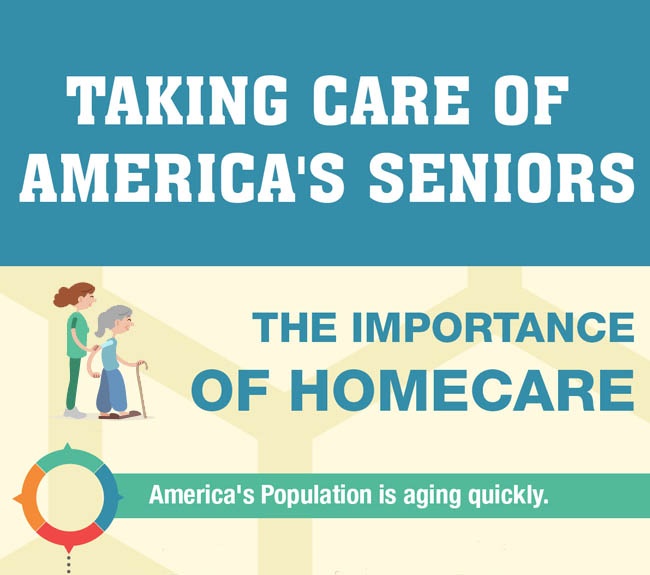In the 1950's less than 10 percent of the country was older than 65. That share will double to 20 percent by 2050. The graying of America will touch everyone in some way in the not so distant future from the changing demographic of the work force to the increased amount of care support that will be needed to assist the nations elderly.
In short, aging will affect everything. It is important for seniors and their families, as well as healthcare professionals to become knowledgeable about the options available to help seniors navigate life after 65. One option available to seniors is homecare.
View the text alternative for Taking Care of America's Seniors infographic.

Share This Image On Your Site
<p><strong>Please include attribution to https://www.caringseniorservice.com with this graphic.</strong><br /><br />
<a href='https://www.caringseniorservice.com/blog/infographic-taking-care-of-americas-seniors-the-importance-of-homecare'>
<img src='https://www.caringseniorservice.com/hs-fs/hubfs/Benefits%20of%20homecare-FINAL.jpg?t=1541628481318&width=1200&name=Benefits%20of%20homecare-FINAL.jpg' alt='Benefits of home care infographic' width='600px' border='0' /></a>
</p>
Taking Care of America's Seniors: The Importance of Homecare
America's population is aging quickly.
- By 2020, there will be approximately 56 million Americans over 65. By 2050, there will be 84 million Americans over 65.
- By 2020, there will be approximately 7 million Americans over 86. By 2050, there will be 19 million Americans over 85.
More American's are in need of care than ever before.
- 40% of adults aged 65+ need daily assistance
- 70% of adults aged 65+ will need assistance at some point
Seniors want to stay in their own homes, but gasp in the care continuum are emerging.
- 9/10 Americans 65 and older want to stay at home for as long as possible
- The base of support will shrink from 7:1 to 3:1 by 2050
- And the average distance between family members is growing to 280 miles
Homecare is an important option in the changing healthcare continuum. It includes:
- Companionship
- Wellness and safety
- Help in and around the home
- Activities of daily living
- Care coordination
- Management of chronic conditions
- Transitional care
The Impact of Homecare
- People 65+ are twice as likely to suffer a fatal fall at home as anywhere else.
- Up to 75% of older adults reportedly make some kind of error taking meds
- Regularly 43% of seniors report feeling lonely
Caregivers help with sometimes dangerous everyday tasks like cleaning and laundry, and they serve as an extra set of "eyes and ears" in the home. Caregivers work to keep seniors healthy by ensuring seniors follow medication regimes and by preparing nutritious meals. Caregivers provide companionship and personalized care to seniors, including listening to stories, playing games, and sharing meals.
Homecare Impacts Families
Family caregivers using home care report better overall health, better ability to hold jobs, and fewer lost wages than those without home care.
Homecare Impacts America's Health System
Caregivers can provide doctors with valuable information that may help improve diagnosis and treatment of seniors and help them avoid costly hospital stays.
- $25 billion savings in hospital costs
- 66% of dementia patients without home care are readmitted to the hospital, while only 58% are readmitted with home care
- There are 25% fewer doctors visits from seniors with home care compared to those without home care.
- 60% of nursing home costs are financed by government funding.
- 13% of home care service costs are financed by government funding.
- 73% of home health service costs are financed by government funding.
Homecare Impacts the Economy
- Annual employer health care savings due to home care services is $13.4 billion.
- Home care provided 1.8 million caregiver jobs in 2014 and is projected to grow 26% by 2024, while all other occupations will only grow 6.5%.
Home care is a fast-growing industry, driving job creation and economic growth across the United States.
Home care is becoming an integral segment of the healthcare continuum.
Sources:
- Home Care Association of America
- Global Coalition on Aging

